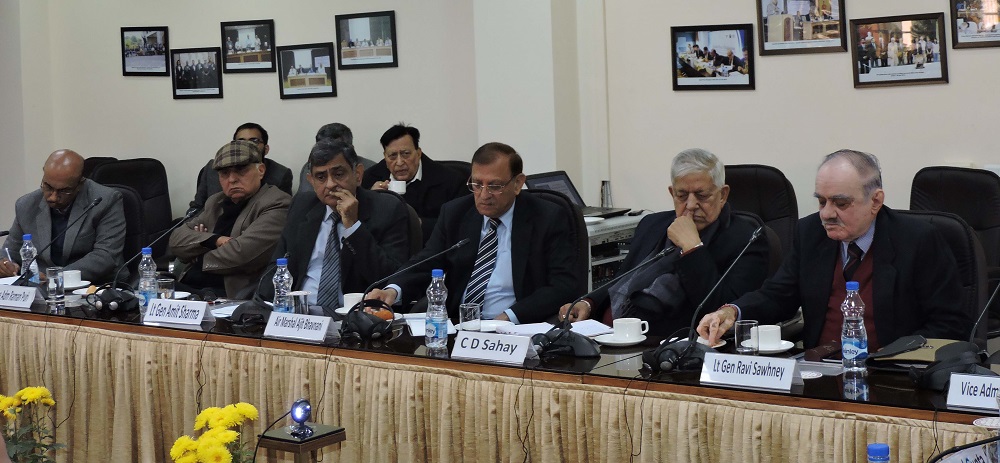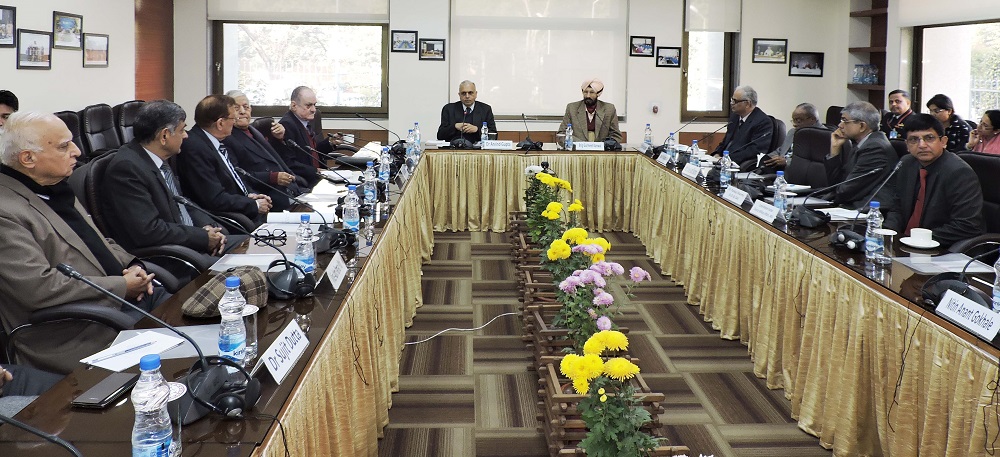The Vivekananda International Foundation (VIF) arranged a panel discussion on 08 Jan 2018 over a recently published book ‘Sharpening the Arsenal: India’s Evolving Nuclear Doctrine’ (HarperCollins, 2017), authored by eminent defence expert, Brig Gurmeet Kanwal. The book, besides bringing a razor-sharp focus on India’s entire nuclear spectrum, also seeks to stir a debate on whether India’s Nuclear Doctrine, entailing a ‘No First Use’ policy, has outlived its utility, especially keeping in view Pakistan’s evolving nuclear postures against India. It may be worthwhile to remember that India successfully carried out nuclear tests in 1998 and followed it up with a declared a No First Use ‘Nuclear Doctrine’ a few later in January 2003. The policy per se has stood the test of time despite Pakistan continuing with its belligerence towards India and attempting to tilt the scale of nuclear balance in its favour with the development of Tactical Nuclear Weapons (TNWs) in recent years.

Views expressed during the panel discussion, including those of the author’s, largely dwelt on whether the development of TNWs by Pakistan could in some ways be perceived as a potential ‘game changer’ in the strategic calculus between India and Pakistan. Panelists, who participated in the discussion, were generally of the view that India’s present Nuclear Doctrine remains a credible deterrence against any possible nuclear adventurism by Pakistan, especially because it makes no distinction between Strategic and Tactical Nuclear Weapons. Further, it was felt that TNWs being inherently destabilising, there is no rationale for India developing its own battlefield nuclear weapons. TNWs are highly complex weapons, as such these are difficult to manufacture and support technically. Technicalities apart, there are economic constraints in developing TNWs for countries like India.
The Discussion also highlighted the fact that Pakistan developed its TNWs in its quest to ‘full spectrum deterrence’ against what is famously known as Indian Army’s ‘Cold Start Doctrine’, envisaging deep incursions into Pakistan’s territory by the mechanised spearheads. It may well be recalled that Pakistan has been unrelenting in waging wars against India since 1947 through both conventional and asymmetric means, a trend which is expected to get even worse with the current Chief of Pakistan’s Army General Bajwa backing up efforts to bring dreaded terrorist organisations like Lashkar-e-Toiba and Jaish-e-Mohammed into Pakistan’s national mainstream. These organisations have been responsible for a number of high profile terrorist attacks on the Indian soil at the behest of Pakistan’s military, especially the Inter Services Intelligence, or the ISI.

The panelists weighed in a number of options against Pakistan’s acts of hostilities against India, including the option of maintaining ‘tactical assertiveness under the umbrella of strategic restrain’. Conjuring up a hypothetical situation of an attack on the Indian soil, Brig Gurmeet Kanwal came up with three options: massive retaliation, quid-pro-quo plus response and no nuclear retaliation. He however postulated that ‘no nuclear retaliation’ shall not be taken seriously as an option due to the unlikeliness of it being a wise choice.
Beefing up India’s nuclear triad with focus on developments in submarine launched ballistic missiles, missile defence programmes, command and control, and preparedness nuclear disasters were among issues that came up for closer scrutiny among the experts. Besides Dr. Arvind Gupta, Director, VIF, Shri CD Sahay, Adm Raman Puri, Lt Gen Ravi Sawhney, among others, participated in the discussion.


